Mulher rendeira — mending rends and weaving together
As Alex Klein and PRIMA plied the byways, barnstorming parched towns with epic names — Cajazeiras, Guarabira, Itaporanga — he discovered a musical calling card in a catchy forró that seemed to be about fixing rips and weaving strands anew.
No one’s sure who penned “Mulher Rendeira” — call it “The Lace Maker” — a festive dance that steals all of Paraíba’s rhythms. Some say bandits wrote it long ago for roving, nighttime festas. These days it’s covered by everyone, Klein included, who sensed it could be an accessible orchestral showpiece and arranged the song himself. Big cellos and heavy basses belong in the backlands’ expanses, Klein figured, so he found harmonies for them in his “Mulher Rendeira” to rope kids in on unfamiliar instruments — all state-owned and inventoried. (That there’s no tradition of symphony orchestras in Paraíba’s vast sertão almost goes without saying.)
The song is so simple, it’s tough to decipher its meaning. “We’re mending rends and crafting pretty things,” perhaps? “It’s all for fun, so join the party!” — certainly. “Let’s find new opportunities and we’ll all get ahead?” — that’s a stretch. But the music always moves a Paraíbano crowd to its feet, and the passionate spirit is deeply sensed by everyone.
“Mulher Rendeira” is the big finale for the concert Sunday, and it’s got the musicians jumping up and down at rehearsal Saturday. Violins hop up and fiddle, then scoot back in their seats when the woodwinds poke forward.
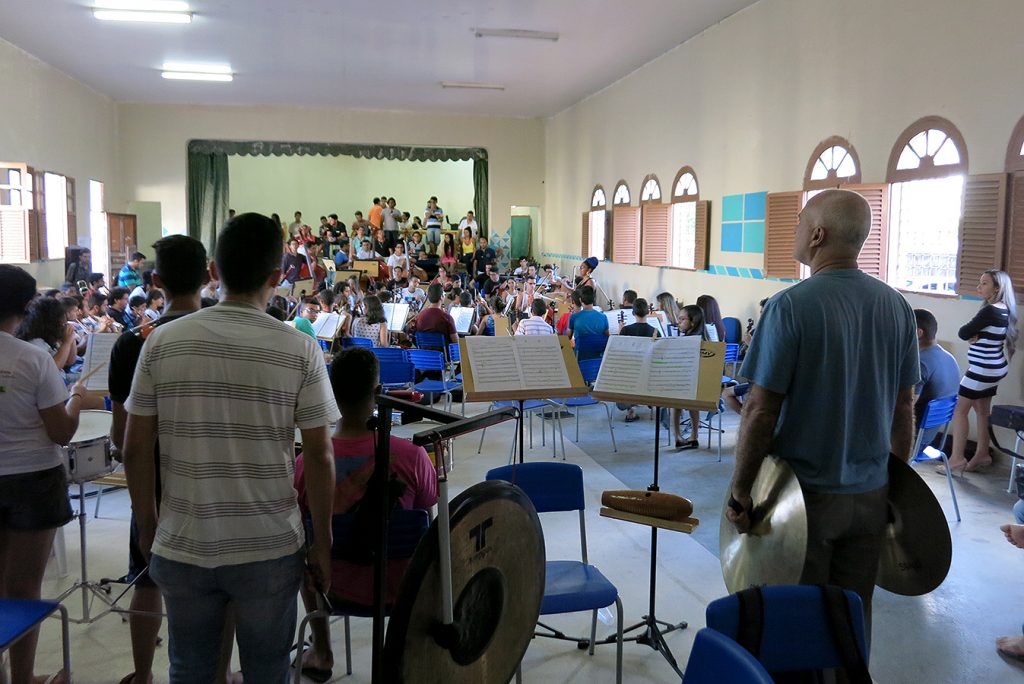
Oboist Alex Klein tries his hand as a PRIMA percussionist. | Photo: Andrew Huckman
Somehow Klein is the only guy moving laterally, an oboe skipping between every instrument but. He’s sounding off around the room, stealing measures from musicians who aren’t back from lunch in time, playing everything all over the orchestra in a song just three minutes long.
“Well, [I tried] the cymbals, there was the tam-tam, and a little bit of maracas and some other percussion instruments I don’t even know the name of,” says Klein as he recounts his rushed, virtuosic weave through PRIMA’s musical arsenal. “And trombone — I think that was about it. The trombone was a four-hand trombone. I was holding and playing and blowing on it, and this student was actually handing the movement.”
That’s the PRIMA spirit — show someone a room full of instruments, and he’ll want to try them all. And tricking an oboist into thinking he plays something else? The cure for focal dystonia is right here in this schoolhouse.
Yet the pinched auditorium, jammed with aspiring musicians, seems Klein’s symptom as much as his salve. He’s trying to keep atop everything he senses needs his attention. “PRIMA is one of them. I am also obsessive about this — about every detail.” But in this schoolhouse, the limitations are equally clear — he can’t always be arranger and oboe, cymbal and trombone all at once. (As Brazil’s most famous gaúcha, supermodel Gisele Bündchen, once colorfully assessed a Super Bowl: “My husband cannot … throw the ball and catch the ball at the same time.”)
The remedy in this room is the energy and commitment surrounding Klein — students who embrace PRIMA’s rigors and aspirations. Maybe they focus on controlling their own circumstances, or perhaps pushing past limited expectations to the uncertainties new opportunities invite. If Klein didn’t realize he could play so many instruments, well, nor did these kids before PRIMA spotted their potential.
“Oxente menino!” The musicians shout it loud to finish every run-through of “Mulher Rendeira,” and all weekend, it’s PRIMA’s quixotic rally cry. How this curious regionalism translates is another matter entirely — no one seems to know. Possibilities run from “Oh, boy!” to “What the fiddlesticks?” or worse. “Hey, kids, what’s this nonsense?” seems about right.
Whether there’s meaning behind the “Oxente menino!” nonsense won’t be answered Saturday. But the question of “what follows the frivolity?” gets to the heart of PRIMA. Is musicianship about discipline, mastery and control, or are players practicing ways to broaden their perspectives and possibilities — somehow, even, all of the above?
Every few minutes “Mulher Rendeira” improves. Play, jump, sit, shout “Oxente menino!” — and wonder what the nonsense is saying.
Maybe there’s a message the kids want Klein to know — about them, or about himself — as his time in Paraíba winds down. Whatever they’re yelling, he doesn’t get it yet. But the oboist is used to cluttered thoughts that sometimes lose direction.
Vai estudar — time to practice
When Klein arrived in Paraíba, the internationally revered oboist wasn’t even capital city João Pessoa’s favorite wind player. “That’s Jurandir do Sax — an amazing guy, an entrepreneur. I love his story and what he does.”
Jurandir embraces Klein’s cardinal virtues — practice, practice, practice. “He likes to go on a boat, to the river and play the saxophone at sundown — play Bolero — and pretty soon a lot of people started going there and watching him.” Klein says “an entire tourist industry was built around him playing the saxophone at sunset — over 5,000 times playing Bolero.”
“Vai estudar.” Time to practice. It’s Klein’s repeated commandment everywhere he goes with PRIMA. Polite encouragement. Guiding principle. Kids beyond earshot giving it a tinged edge. Hollered out the window of a minivan, past sunset, when João Pessoa’s No. 2 wind impresario heads home, smiling.
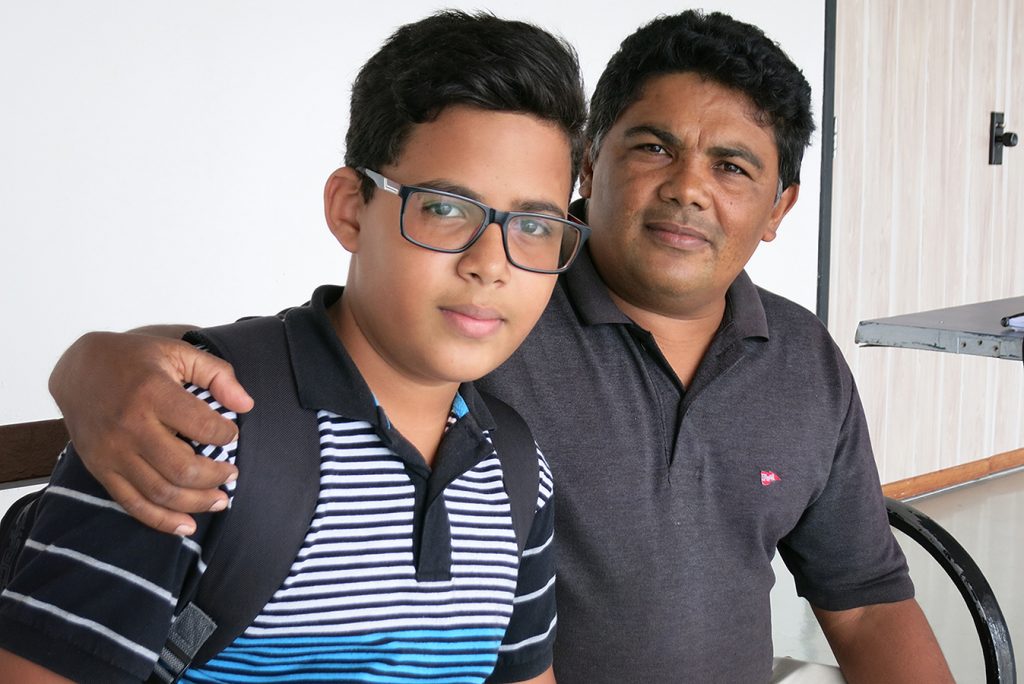
PRIMA horn player Espedito Júnior (left) with his father Espedito, who drove eight hours for his son’s concert. | Photo: Andrew Huckman
Past the pinched school auditorium, there’s a classroom for every instrument. Saturday afternoon the first violins practice just off the courtyard, second violins in room two. Riffs and runs pour from every open window. Winds and horns are down the arcade with Klein, readying Richard Strauss’ Serenade for Winds for the concert Sunday evening.
Espedito Júnior, a horn player from Catolé do Rocha, deep in Paraíba’s interior, rode a bus eight hours for the gathering this weekend. (It required a 12-hour trip for many.) His father Espedito drove separately, one of the few parents traveling to see a son or daughter play at the concert — perhaps the only one. Time, distance — even expense — make the in-state trip a hardship.
PRIMA doesn’t have a horn instructor in Catolé do Rocha, so Espedito Júnior learns on his own. José Wilker, a roving teacher, sees Espedito Júnior every three months and praises his “incredible sound.” Wilker’s met the father, too: “His dad told me he would maybe like to change to [the capital] João Pessoa for Espedito to have more opportunity to have a professional teacher — more classes with the French horn. He asks me what we think about Espedito, and about the future.”
There’s a strength in the father’s stern visage, like a man who’s weathered plenty but now senses opportunity rests with his son. Klein translates: “He’s very proud and happy for his son, for what he’s doing.” Dad’s brow is fixed and there’s no hint of a smile — Paraíbanos know to temper optimism. “His hope is [Espedito Júnior] is going to grow and have many more opportunities than his father had.”
There’s no coaxing smiles from Anderson, either, a young oboist from Alto do Mateus, intent on the intricacies of Strauss — vai estudar. Klein landed the oboists student models from his own Paris maker, specially fitted with plastic sheaths to resist heat, humidity and arid conditions. Anderson practices and persists on his, searching for the same rich sound that flows from Klein’s custom model. The young oboist’s technical skills seem assured, but it’s a struggle to reach the depth of expression his mentor encourages.
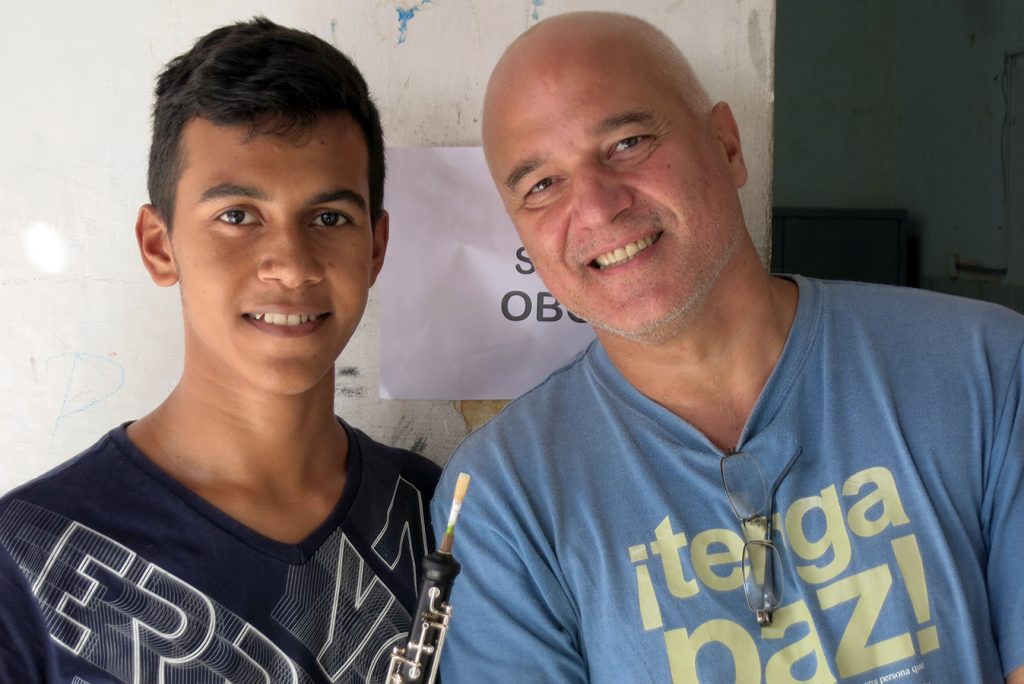
Anderson (left) with his mentor Alex Klein. | Photo: Andrew Huckman
With Anderson, and with all of PRIMA’s students, Klein and his teaching colleagues prioritize and make choices. Just as managing focal dystonia means grasping parameters and adapting to limitations, PRIMA realistically balances its musicians’ circumstances and aspirations — Klein asking again, “How much is too much?”
He cuts short the Strauss rehearsal when two players mention tendonitis. The students have a difficult travel and practice schedule — long bus rides, followed by marathon rehearsals for Sunday. Klein’s pushing himself, too — flying overnight Thursday from Chicago to Paraíba, after a Ravinia Festival concert with the CSO on Tuesday, then heading straight from the airport to PRIMA’s rehearsals Friday. Three days from now, next Tuesday, he moves his family to Chicago; he’ll play the rest of Ravinia’s season, too. So it’s a surprise to see students and teachers relaxing near the courtyard as Klein (“This guava juice is amazing!”) reflects on the program’s goals.
“If a kid is not playing well, that’s not something that concerns us,” Klein says. “What concerns me is if they’re not happy in citizenship, in discovering that society belongs to them. So if something’s out of tune, we think twice about criticizing the musicianship. … We don’t want to sacrifice our work in citizenship just because we want them to play something a little better.”
It’s a message momentarily lost on Anderson, who gets asked whether he’ll perform with Klein again somewhere down the road. “I don’t know, but I’ll practice a lot.”
Today Klein isn’t hollering “vai estudar” — by now everyone knows, anyway. Instead he’s wearing a T-shirt in Spanish and English that says “¡tenga paz!” — “(slang) expression used to ask another person to stay calm.”
But PRIMA’s kids speak Portuguese. Will the new message register?
Mulher macho — sim, senhor! That’s our choice
There’s no mistaking the T-shirts with the message “Autonomia para as mulheres, essa é nossa decisão,” or “Autonomy for women — that’s our choice.” (There’s a smaller emblem reading “PARAÍBA MULHER FORTE E DE VALOR” — “PARAÍBA WOMEN, STRONG AND PROUD.”) Several of PRIMA’s young women sport the shirts Saturday, underscoring the citizenship initiatives this musical weekend encourages.
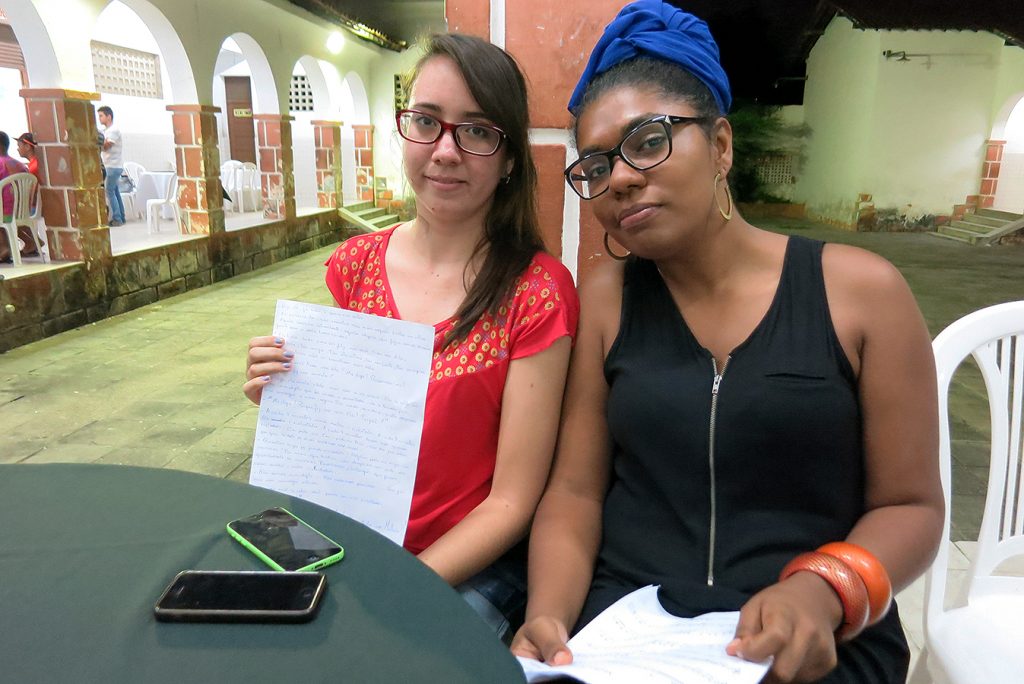
Natalia (left), an aspiring poet and cellist, draws inspiration from incoming PRIMA director Priscila Santana. | Photo: Andrew Huckman
Natalia is a cellist, also from Catolé do Rocha in Paraíba’s backlands, where old roles and dated rubric can acquire the unwelcome veneer of tradition. “I look at my life as a woman,” she says. “Women often feel violated, not always literally, but through words and gestures and leering.” It’s a constant battle for her. “Men push the boundaries with us, but we weren’t born to be objects, even if they refuse to understand that.”
There’s an old song in Paraíba — it’s even titled “Paraíba” (1950) — and folks around Brazil know its catchy, notorious lyrics like a northeastern battle hymn: “Paraíba masculina. Mulher macho — sim, senhor!”
Paraíba’s so masculine that — yes, sir! — even the women are macho.
There’s no easy way to talk to Paraíbanos about Paraíba’s self-awareness — the legacy and its evolution — without the controversial moniker “mulher macho” showing up. What outsiders might dismiss as a frustrating pejorative invites conversations inside Paraíba, across genders and generations, about whether and why a comical ditty from long ago might speak to a modern region still steeped in defiance. They’re the type of complex, continuing explorations of culture and citizenship PRIMA often fosters.
“Paraíba has been closed, culturally, to the rest of Brazil,” Klein says, “and that lack of communication has allowed for certain old-school ideals to prevail,” which — Klein is adamant — have no place in PRIMA. “Macho … homophobia, violence, all of these things — they’re not modern ideas anymore, and we need to find a way to climb above this.
“Maybe at some point a woman in Paraíba who wanted to be somebody was touted as a man, so in that sense I’d say the song is pejorative. My focus is trying to make this right.”
Priscila Santana, a flutist and emerging conductor from the nearby state of Bahia, will take over PRIMA once Klein returns to Chicago. She says she posted “mulher macho — sim, senhor!” on Facebook right when she got the Paraíba job. Together with Klein, Santana helps PRIMA’s young women find, through musicianship, the strength and confidence to launch their voices on larger stages.
Santana interrupts the Saturday rehearsal she’s leading, sets down her baton and starts speaking from the improvised conductor’s podium. A hundred players grab their instruments and listen, rapt and attentive.
“The instrument allows you to be who you want,” Santana tells them. “You can express all of your emotions through that instrument. This is not only an instrument for us to play, but an instrument to change our lives.”
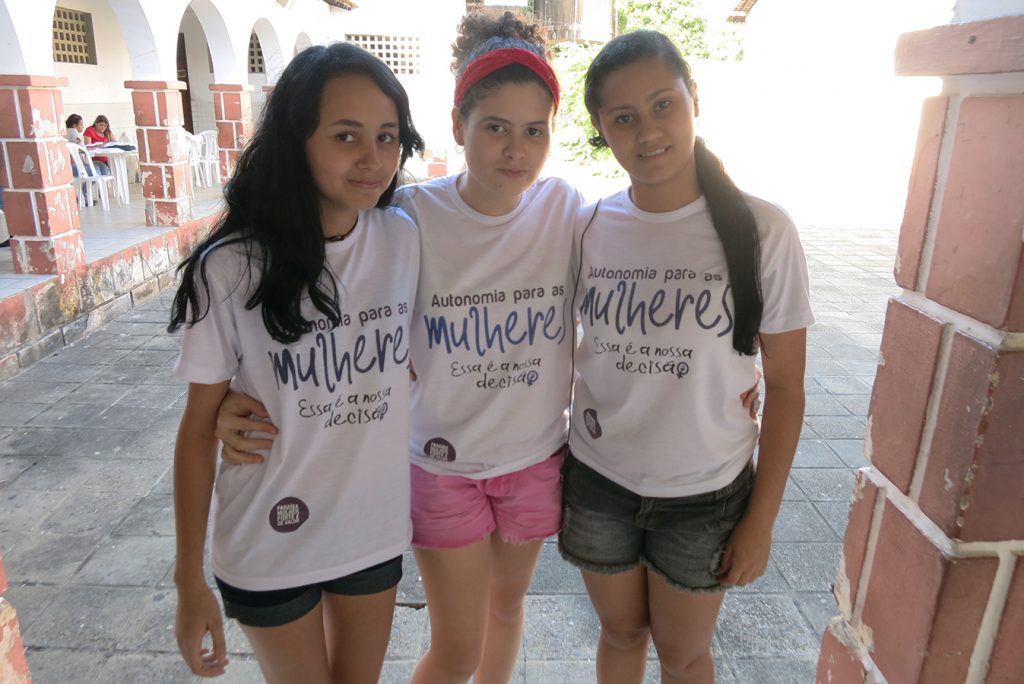
PRIMA percussionists (from left) Aline, Maria Clara, and Thamyres wear T-shirts with the slogan “Autonomy for women — that’s our choice.” | Photo: Andrew Huckman
Klein and Santana know the Sunday concert will be interrupted, too, not by mentors like themselves, but by PRIMA’s own aspiring musicians. Seven women, including the cellist Natalia, will confront the audience with words and banners denouncing Paraíba’s culture of sexual violence — what they say, and how they say it, is up to the women. Natalia, it’s rumored, has written a charged poem that shares her emotions. No one’s certain the demonstration will be tolerated, or even understood.
But everyone embraces the risk, Klein and Santana included. “It’s giving this voice to the women,” she says. “It’s talking about this problem — it’s not just being blind.”
Klein is less measured. “I want people to be enraged about [the demonstration], to think it is scandalous to do in a concert with young people — because then they’ll be talking about it.”
If positively co-opting Paraíba’s “mulher macho” image means challenging concert audiences to confront civic failings, it’s about changing cultural expectations, too — like powering PRIMA’s orchestra in the percussion-driven northeast with a woman pounding the timpani.
Maria Clara hails from Campina Grande, a spiritual home of forró — the dance-all-night regional beat behind “Mulher Rendeira,” and Brazil’s guilty pleasure.
“I feel so happy — I feel like dancing and jumping, I’m so excited,” she says before rehearsal. “It’s so great to play this music.” At 3 years old, she started playing forró with her family, mastering the triangle by 5, but the music that has her worked up today is Tchaikovsky’s Slavonic March, another PRIMA showcase — and a timpanist’s, too. “I was always crazy about drums — that’s how, through forró, I got to classical music.”
Maria Clara’s donned the bold “Autonomy for women” T-shirt but her other choices this Saturday are deferential and reserved. She says she’s concerned about her rehearsal appearance — her hair is bunched up and out of the way for playing Tchaikovsky.
“This really makes me feel sad,” Santana says. “They don’t feel comfortable like they are.” But she’s confident Maria Clara, and all of PRIMA’s players, will rise to the occasion for tomorrow’s concert — Klein’s farewell.
“The mind changes everything.” Santana is sure. “If you are confident to play, you are confident to talk, you are confident to change.”